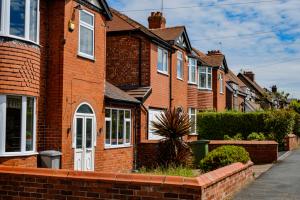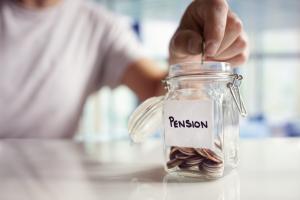Pension or Property? Saving for Retirement as a UK Expat

On the whole property prices in the UK have risen substantially over time. This is what leads many UK expats to believe that investing in a rental property is a viable alternative to a pension.

The average price of a property in the North West is £189,000, meaning that a 25% deposit would require an investment of £47,250.
For UK expats, investing in UK property can be a viable alternative to a pension or diversify a retirement savings portfolio.
According to Hargreaves Lansdown, during the pandemic, a quarter of people have either stopped or reduced the amount that they contribute to their pensions. It’s understandable that, given the economic uncertainty that Covid-19 has brought to many lives, people would cut back on payments they believe they can do without. In many people’s eyes, pension contributions fell into that category.
For many, it’s hard to recognise how contributing to a pension can benefit them as they feel they have no real control over where and how their savings are going to be used to provide for their later lives. In fact, according to Unbiased, a fifth of UK over-55s have no pension at all.
For those without a pension, or those who are unsure about whether a pension is a worthwhile place to put their money, it’s still important to find a way to save for your retirement. Often, one of the first options that UK expats consider as a pension alternative (or as part of a diverse portfolio) is to invest in buy-to-let property. This can come in the form of a single property or, for more seasoned investors, as a fully-fledged property portfolio.
The UK Property Price Boom.
‘The price of houses in the UK just keeps rising. Anecdotally, it’s incredible to see how much prices have risen – even since I bought my first home’ says Stuart Marshall. ‘According to Halifax, the average cost of a home in the UK has more than trebled since the start of the century. Despite huge global events which have caused the prices of property to fall at times, it’s clear that on the whole property prices in the UK have risen substantially over time. This is what leads many UK expats to believe that investing in a rental property is a viable alternative to a pension.’
Pension or Property Investment: How Much Do You Need?
‘The first thing you need to consider is your savings goal’ says Stuart Marshall, CEO of Liquid Expat Mortgages. ‘Knowing your goal in advance is important before starting any financial venture. If you decide on a pension, you need to know how much you will ultimately need for a comfortable retirement in order to make the requisite contributions. According to Royal London, a comfortable retirement will necessitate a pension pot of £260,000. With this figure in mind, you will be able to work out roughly how much you will need to save to reach this sum by pension age. Similarly, you can work out how much investing in property might contribute towards this goal.’
‘If we use Royal London’s figure of £260,000, it’s easy to see how a property portfolio might contribute to a comfortable retirement.’
Suppose, for example, that you purchased a property in the North West – one of the hotspots for UK expats looking to invest in property. The average price of a property in this area is £189,000, meaning that a 25% deposit would require an investment of £47,250. With a typical mortgage term of 25 years, this property will be paid for in full. So, to pay this property off by the time you reach a pensionable age of 67, you would have to start investing before you turn 42. Evident here is one advantage of property investment compared to a pension – you can start much later and still have a fruitful outcome. So, property investment will typically be better for older UK expat savers looking to start putting away funds for retirement. Of course, you can also overpay on many mortgages and pay off your property early if you so desire. This can increase the profitability as 100% of the rental profits will go to you, rather than contributing to mortgage payments. It will also reduce the amount you pay in interest over the term of your mortgage.
‘The focus is so often on rental yields. However, if you see the rental yield as simply paying the mortgage, it’s much easier to view property investment as a savings vehicle rather than a business venture. Of course, it can be both. But, for the purposes of retirement saving, it’s easier to see investing as a long-term savings vehicle whereby your tenant pays off the capital. There is currently the added benefit that many lenders are offering some amazing UK expat and foreign national mortgage products, which makes a buy-to-let property look even more attractive.’
But how can the above calculation help to reach the £260,000 that Royal London recommends for comfortable retirement? ‘The clue is in the price growth of property over time and the fact that, over the course of the mortgage term, the tenant will have contributed substantially to paying off the capital and interest!’ says Stuart Marshall. ‘According to housing portal Zoopla, house prices in the North West have risen by 7.3% in the last 12 months. Meanwhile, the Office for National Statistics has the price rise in the North West at over 15%. With these capital growth figures in mind, it’s easy to see how the average property in an area like the North West could appreciate to a figure comfortable for retirement. Savills predicts that the value of property in the North West will grow by 28.8% by 2025. If we apply this calculation to our average property of £189,000 mentioned above, this brings the total value of the property to £243,432 – a figure in the region of the Royal London target.’
‘To make sure your investment is profitable, it’s important to consider consumer demand. The demand from consumers will inform both the location and the type of property you end up choosing for your investment. Choosing a property which is in high demand will minimise the risk of breaks to rental income and make sure void periods are kept to a minimum. It can help to imagine your ideal tenant for this purpose. For example, if your ideal tenant is a family, a studio apartment will be a poor choice of property for the specific goals of your investment, whereas a three-bedroom house in the suburbs might be preferable for these purposes.’
Pension or Property Investment: Some Considerations When Investing in UK Property.
‘Let’s first look at some of the difficulties involved with becoming a UK expat buy-to-let investor. One hot topic of discussion in recent times has been the new legislation meaning that buy-to-let landlords can no longer offset mortgage interest against tax. Further, buy-to-let investors have to pay an extra 3% stamp duty and overseas buy-to-let investors will have to pay a further 2% surcharge on top of this. This obviously makes investing in UK property more expensive for UK expats and foreign nationals.’
However, there are ways to mitigate the effects of these difficulties. One such way is to incorporate the property as part of a limited company or special purchase vehicle. This way, any extra costs can be offset against tax. Further, mortgage interest will count as a legitimate business expense so there will be no limit to the tax relief for mortgage interest.
‘Another thing you need to think about when deciding between a pension or property investment as a UK expat or foreign national is that you’ll need money up front to buy an investment property. A pension only requires periodic contributions. Of course, if you have surplus income which you have saved, putting your money into property could be an excellent alternative to a savings account, regardless of whether or not you have a pension. This is because you’re almost certain to have your savings appreciate more than they would from the interest rates currently available in a savings account. Bear in mind that most lenders will require a minimum 10-25% deposit so, once you’ve decided your savings goal, you can calculate the required deposit amount accordingly.’
Lastly, it’s important to be aware of some of the additional costs that can come with property investment. These can include broker fees, surveys, solicitors’ fees and building insurance. A more comprehensive list of considerations can be found here. Other hidden costs can come after you have purchased the property – such as long void periods or problem tenants – and these can be harder to deal with or account for. However, doing your research and buying the right property in the right area for your particular target audience will help to limit the possibility of these occurrences.
As always, talking to an expert UK expat mortgage broker will help to navigate some of the pitfalls of property investment and maximise the profitability by allowing you to find the right mortgage product for your needs.
Pension or Property Investment: Pros of Investing in UK Property.
The pros of investing in UK property as a UK expat are much discussed. For one, the asset class is typically considered to be relatively safe and stable. UK property has historically always appreciated over the term of the mortgage too so putting your money in bricks and mortar can be considered to function similarly to an excellent savings account.
You are also likely to profit in a number of different ways from property investment, with rental yields providing you an income on a monthly basis and capital growth contributing to the long-term profitability of the investment. ‘The UK housing market just continues to grow, pointing to the fact that if you invest in UK property, you’re bound to make strong returns. The average price of a UK home has just hit a new high of £230,700 – 30% higher than in 2007. Other reports show that 1 in 5 UK homes appreciated by more than the average UK salary in the last twelve months. These massive gains in value are case in point of why property investment is so popular for UK expats and a legitimately viable alternative to a pension. Property investment can quickly pay dividends – as is evident from the price rises in the last 12 months – or, if you decide to invest long-term, then property can contribute to your salary while saving for your retirement at the same time. This is one huge benefit of property investment over a pension.’
‘Pensions can be considered to be a one-dimensional savings vehicle – they save for the singular purpose of providing a comfortable retirement. However, property can provide a multi-faceted savings vehicle. The money you make from property investment on a monthly basis can be used to pay for whatever you want. The bulk of your retirement savings would be in the property itself and can be ‘cashed in’ whenever you like by selling the property – another advantage over pensions which can only be taken once you reach a certain age.’
As mentioned earlier, investing through a limited company or special purchase vehicle is an option that would further increase both the profitability and flexibility of your investment. By doing this, you can keep the profits from your investment within your company and use this money to purchase more properties and thus grow the value of your retirement pot. You can also offset expenses against tax as well as paying a lower rate of tax on your income – 19% corporation tax instead of higher rate income tax of up to 45%.
Pension or Property Investment: Summing Up.
‘The figures speak for themselves’ says Stuart Marshall. ‘Ultimately, with so many older UK expats without a pension, property investment is the best way to save for retirement, especially if they intend to return to the UK in later life. By investing in the right growth area, you can subsidise your salary and contribute to a viable alternative to a pension. With UK property predicted to grow in the way that it is, property investment should be considered even by those UK expats and foreign nationals who have pensions.’
Liquid Expat Mortgages
Unit F2, Waterfold Business Park,
Bury BL9 7BR
Phone: +44 (0) 161 871 1216
www.liquidexpatmortgages.com
Any media enquiries please contact Ulysses Communications
sergio@ulyssesmarketing.com
+44 (0) 161 633 5009
Sergio Pani
Ulysses
+44 7811 326463
email us here
Visit us on social media:
Facebook
Twitter
Legal Disclaimer:
EIN Presswire provides this news content "as is" without warranty of any kind. We do not accept any responsibility or liability for the accuracy, content, images, videos, licenses, completeness, legality, or reliability of the information contained in this article. If you have any complaints or copyright issues related to this article, kindly contact the author above.



